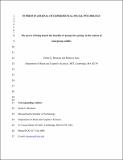| dc.contributor.author | Bruneau, Emile G. | |
| dc.contributor.author | Saxe, Rebecca R. | |
| dc.date.accessioned | 2015-09-18T16:01:07Z | |
| dc.date.available | 2015-09-18T16:01:07Z | |
| dc.date.issued | 2012-03 | |
| dc.date.submitted | 2012-02 | |
| dc.identifier.issn | 00221031 | |
| dc.identifier.issn | 1096-0465 | |
| dc.identifier.uri | http://hdl.handle.net/1721.1/98833 | |
| dc.description.abstract | Although hundreds of dialogue programs geared towards conflict resolution are offered every year, there have been few scientific studies of their effectiveness. Across 2 studies we examined the effect of controlled, dyadic interactions on attitudes towards the ‘other’ in members of groups involved in ideological conflict. Study 1 involved Mexican immigrants and White Americans in Arizona, and Study 2 involved Israelis and Palestinians in the Middle East. Cross-group dyads interacted via video and text in a brief, structured, face-to-face exchange: one person was assigned to write about the difficulties of life in their society (‘perspective-giving’), and the second person was assigned to accurately summarize the statement of the first person (‘perspective-taking’). Positive changes in attitudes towards the outgroup were greater for Mexican immigrants and Palestinians after perspective-giving and for White Americans and Israelis after perspective-taking. For Palestinians, perspective-giving to an Israeli effectively changed attitudes towards Israelis, while a control condition in which they wrote an essay on the same topic without interacting had no effect on attitudes, illustrating the critical role of being heard. Thus, the effects of dialogue for conflict resolution depend on an interaction between dialogue condition and participants' group membership, which may reflect power asymmetries. | en_US |
| dc.description.sponsorship | Alliance of Civilizations (Media Fund) | en_US |
| dc.description.sponsorship | MIT Wade Family Fund | en_US |
| dc.language.iso | en_US | |
| dc.publisher | Elsevier | en_US |
| dc.relation.isversionof | http://dx.doi.org/10.1016/j.jesp.2012.02.017 | en_US |
| dc.rights | Creative Commons Attribution-Noncommercial-NoDerivatives | en_US |
| dc.rights.uri | http://creativecommons.org/licenses/by-nc-nd/4.0/ | en_US |
| dc.source | OAPOT | en_US |
| dc.title | The power of being heard: The benefits of ‘perspective-giving’ in the context of intergroup conflict | en_US |
| dc.type | Article | en_US |
| dc.identifier.citation | Bruneau, Emile G., and Rebecca Saxe. “The Power of Being Heard: The Benefits of ‘perspective-Giving’ in the Context of Intergroup Conflict.” Journal of Experimental Social Psychology 48, no. 4 (July 2012): 855–866. | en_US |
| dc.contributor.department | Massachusetts Institute of Technology. Department of Brain and Cognitive Sciences | en_US |
| dc.contributor.mitauthor | Bruneau, Emile G. | en_US |
| dc.contributor.mitauthor | Saxe, Rebecca R. | en_US |
| dc.relation.journal | Journal of Experimental Social Psychology | en_US |
| dc.eprint.version | Author's final manuscript | en_US |
| dc.type.uri | http://purl.org/eprint/type/JournalArticle | en_US |
| eprint.status | http://purl.org/eprint/status/PeerReviewed | en_US |
| dspace.orderedauthors | Bruneau, Emile G.; Saxe, Rebecca | en_US |
| dc.identifier.orcid | https://orcid.org/0000-0003-2377-1791 | |
| mit.license | PUBLISHER_CC | en_US |
| mit.metadata.status | Complete | |
